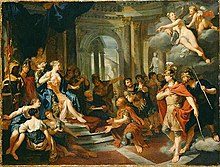Aeneid Stanley Lombardo Pdf To Word
A more modern American version by Stanley Lombardo, deservedly acclaimed, reads thus, with the simile italicized: On they went, shrouded in desolate night. Through shadow, through the empty halls. Of Dis and his ghostly domain, as dim. As a path in the woods under a faint moon. When Jupiter has buried the sky in. Virgil, Stanley Lombardo. I come to the Aeneid, as Virgil did, through Homer. The Aeneid is modeled so closely upon Homeric epic that the poet Joseph Brodsky was moved to remark that Homer is the only true audience Virgil can have. And yet, although he adopts the structure, theology, episodes, and. Aeneid by Virgil, Lombardo, Stanley, Textbook PDF Download archived file. Download link: File name: document_id_237614.zip. File type: Self extracted ZIP. File size: 86.32 MB. Uploaded: January 31, 2015. Enjoy:) Lorem Ipsum is: Aeneid - Wikipedia, the free encyclopedia The Aeneid is a Latin.

Stanley Lombardo's deft abridgment of his 2005 translation of the Aeneid preserves the arc and weight of Virgil's epic by presenting major books in their entirety and abridged books in extended passages seamlessly fitted together with narrative bridges. Fender Jackson Serial Numbers. Johnson's Introduction, a shortened version of his masterly Introduction to that translation, will be welcomed by both beginning and seasoned students of the Aeneid, and by students of Roman history, classical mythology, and Western civilization.
Editor’s note: Stanley Lombardo’s presentation of Homer’s Iliad at 3:30 p.m. Thursday in the Hall of Philosophy has been canceled. The book still serves as an official Chautauqua Literary and Scientific Circle selection. Stanley Lombardo’s translation of Homer’s Iliad begins with a declarative word — short, but in all caps: rage.
That’s what drew President Tom Becker and Sherra Babcock, vice president and Emily and Richard Smucker Chair for Education, to the work. “It’s the original war story,” Babcock said. “And it begins with the word ‘rage.’ The question of the week is, ‘Are we built with some rage, something that suggests war is almost hardwired?’ That’s a question we’re going to be asking all week.” Lombardo’s translation is this week’s Chautauqua Literary and Scientific Circle selection. Lombardo has translated works from across the world, including the Tao Te Ching, Sappho’s poems, and Dante Alighieri’s Inferno. He previously visited with the CLSC in 2007 to present his translation of Virgil’s Aeneid. For Lombardo, the translation process involves falling in love. “When I fall in love with the poets’ voices — it’s hard for me to describe how this works,” Lombardo said.
“I can’t translate anything — I can do hack work, and it might be OK — but I can’t really translate anything unless I hear the voice of the original poet somehow as my own voice, or hear my voice as the voice of Homer or Virgil or Ovid or Dante. It’s a meeting of minds, you might say.” And after he falls in love, Lombardo said, there’s a bit of a gestation period, which can range from a single year to decades.
He recently finished his translation of Alighieri’s Divine Comedy, a project he said was 30 years in the making. Iliad, which he first read in Greek as an undergraduate, took six years.

Lombardo’s work is the selection for Week Eight, the theme of which is “War and Its Warriors: Contemporary Voices.” Homer’s work is thousands of years old, so it’s anything but contemporary. But Babcock said Lombardo’s translations, as well as his verbal delivery of them, brings a freshness to one of the world’s oldest war stories.
“Listening to him read the classics makes you want to go back and read the classics,” Babcock said. “His translations are also a little bit looser, more poetic and more emotional.” Lombardo provided his own example of that contemporary effect. He was once doing a reading from his translation of the Iliad, reciting a scene between Achilles and Hector, when he was joined by some unexpected visitors. “These people on the street came in, kind of half-stoned,” Lombardo said.
“They came through the crowd and sat right in front of me on the floor, just gawking up at me. And as soon as I finished, one of them stood up, turned around to the audience, hitched up his pants, and said, ‘Well, Hector — that was a good man.
But Achilles — now there’s a real son of a bitch.’ ” Achilles may be a compelling and complex S.O.B., but Lombardo said he’d like to focus his on the women of the Iliad. He said war is a crucible that shows what humans are truly made of, and Homer’s women are wonderfully diverse examples of that theme. The Iliad features mothers, queens, wives, priestesses, lovers, goddesses and the most beautiful woman in the world. But what’s essential is their humanity, Lombardo said, even when a character is divine, such as Achilles’ mother Thetis. “Even though she is a goddess, she shows us what a mother is going through when her child is off at war,” Lombardo said. He said his favorite character to bring to life was Helen.